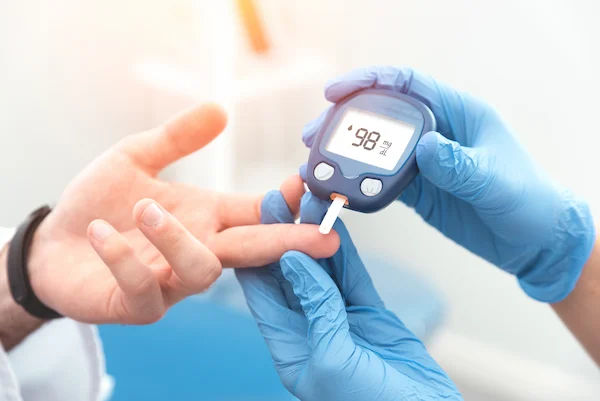Understanding The Relationship Between Diabetes And Sleep Duration
Understand the impact of sleep duration on diabetes management. Learn about common sleep issues, the relationship between sleep and blood sugar levels, and lifestyle changes to improve sleep.

Written by
Last updated on 3rd Jul, 2025
Diabetes is a severe illness in which the body either cannot manufacture enough insulin or is unable to use it to adequately manage the high blood glucose levels. To manage this disease, individuals are prescribed medication, an active lifestyle and adequate sleep.
Now, diabetics tend to have several sleep-related issues, which can hinder their efforts to keep blood sugar levels under control. In this regard, knowing the common sleep issues, the impact of sleep duration on diabetes management, and required lifestyle changes is an absolute must.
Relationship Between Diabetes and Sleep
Diabetes can affect people's quality of sleep, and those suffering from this condition readily testify to the sleep disturbances caused by it:
Increased urination, a major sign of uncontrolled diabetes, prevents uninterrupted sleep for most patients.
Nerve damage (neuropathy) may also cause discomfort, making falling or staying asleep difficult.
These symptoms can not only disturb sleep but also complicate diabetes management. Here’s how:
Sleep deprivation enhances insulin resistance and aggravates diabetes.
Research has shown that even a single night of sleep deprivation is sufficient to impair glucose metabolism and raise blood sugar levels.
Sleep is vital for maintaining a balanced blood sugar level and good health. Adequate sleep duration and quality may thus be a good strategy for further improving glycemic control and reducing some complications associated with diabetes.
Common Sleep Issues in People with Diabetes
Some of the most common sleep issues faced by diabetic patients are:
Sleep Apnea
Most diabetics experience obstructive sleep apnea, which causes them to have an erratic sleep pattern and increases their resistance to insulin.
Restless Leg Syndrome
This phenomenon would be characterised by very uncomfortable feelings in the legs that deter individuals from sleeping, thus making handling diabetes even more difficult.
Insomnia
Most people with diabetes, if not all, suffer from insomnia due to worrying about their treatment or physical discomfort resulting from complications.
Impact of Sleep Duration on Diabetes Management
Increased or reduced sleep duration can significantly affect diabetes risk and management:
Short sleep durations of less than six hours are strongly associated with increased incidence of Type 2 diabetes. Studies suggest that the risk of insulin resistance and high blood sugar levels increases significantly in people sleeping below the recommended seven to eight hours.
Short sleep duration interrupts metabolic processes like glucose regulation, making it difficult for the body to manage blood sugar effectively.
However, increasingly long sleeping hours (generally over eight) are also linked to a higher risk of diabetes, though the mechanism is poorly understood.
Although the relationship of diabetes with long sleep durations may not be as compelling as that with short sleep durations, extremities, in both cases, are associated with metabolic dysfunction. Thus, balancing sleep duration reduces the risk of diabetes.
Diabetes and Sleep Duration: Scientific Studies and Evidence
As per a study conducted in October 2023, individuals with a sleep duration of 5 hours and 12 hours were at a higher risk of type-2 diabetes compared to those with an 8-hour sleep duration. However, no such relationship was found between sleep duration and prediabetes.
Additionally, another study reported excessive daytime sleepiness in 12.2%, trouble staying asleep in 21.9% and trouble falling asleep in 21.1% of the test subjects.
Managing Sleep for Better Diabetes Control
Improving sleep quality is important for diabetes patients as it helps achieve better glycemic control and overall health. In this regard:
Establishing a regular sleep schedule is one of the best ways to improve sleep quality.
Going to bed and waking at the same time every day, including on weekends, can help regulate the body's internal clock and aid in regular restful sleep.
Create a quiet and cool environment for sleeping. This would lead to fewer distractions and enhanced relaxation.
Limiting screen time before bed also helps, as it prevents the blue light emitted from phones, tablets, and computers from interfering with the production of melatonin, a sleep-regulating hormone.
Sleep hygiene significantly improves an individual's quality of sleep. Some activities that enhance sleep are:
Keeping the bedroom dark and cool.
Avoiding caffeine or large meals within two hours of bedtime.
Relaxing before sleep.
Why is Good Sleep Hygiene Important for Diabetic Patients?
Healthcare experts recommend good sleep hygiene, in addition to good sleep quality, for promoting blood sugar control. Research has proven that those practising good sleep hygiene have active metabolic regulation. This minimises the chances of insulin resistance occurences, taking diabetes management to another level.
Additionally, with good sleep habits, diabetic patients can improve their overall health, which in turn enhances glycemic control.
When Should Diabetics Seek Medical Advice for Sleep Issues?
Recognising sleep disorders is crucial for effective diabetes management. In this regard, one should do the following:
Keep track of symptoms such as persistent insomnia, excessive daytime fatigue, or loud snoring.
They may indicate underlying sleep disorders, like sleep apnea or restless leg syndrome, that require medical evaluation. These conditions can disrupt sleep and exacerbate blood sugar fluctuations, so it is crucial to address them early.
For those experiencing significant sleep issues, consulting healthcare professionals is essential.
They can offer tailored recommendations or treatments, such as sleep studies or medication, to address the root causes of sleep disturbances. This will help improve overall sleep quality, ultimately supporting better diabetes management.
Lifestyle Changes for Optimal Sleep and Diabetes Control
A balanced diet and regular physical activity are pivotal in managing diabetes and improving sleep quality. In this regard:
Consume a nutrient-rich diet, particularly one high in fibre, healthy fats, and low in refined sugars. It helps stabilise blood sugar levels and reduce the risk of diabetes complications.
Take part in regular physical activity as it promotes better cardiovascular health, reduces insulin resistance, and can enhance sleep by regulating circadian rhythms.
Alongside diet and exercise, practise stress management techniques, such as mindfulness meditation or yoga.
These practices help lower stress hormones, which can interfere with both sleep and blood sugar control. Reducing stress improves mental health and positively impacts sleeping patterns, supporting better diabetes management.
Combining a healthy lifestyle with effective stress management can significantly improve sleep quality and help individuals manage diabetes more effectively.
Conclusion
Sleep is essential for managing diabetes. Lack of sleep and too much sleep affect blood sugar levels by increasing insulin resistance and worsening symptoms. Detecting sleep disorders, maintaining good sleep hygiene, and a proper sleep schedule are essential treatment plans for improving overall diabetes management.
Additionally, one can make active lifestyle changes to improve sleep quality and overall health. These include maintaining a healthy diet, engaging in physical activities and managing stress.
Consult Top Endocrinologist
Consult Top Endocrinologist
Dr. M.a. Mujeeb Afzal
Endocrinologist
13 Years • MBBS , MD (General medicine) , DM (Endocrinology)
Hyderabad
Diabetes Thyroid and Hormones (DTH) Clinic, Hyderabad

Dr. Nithin Reddy Modhugu
Endocrinologist
6 Years • MBBS, MD (General Medicine), DNB (Endocrinology)
Hyderabad
Dr. Nithin's Endocrine Clinic, Hyderabad
(100+ Patients)

Dr. Gayatri S
Endocrinologist
4 Years • Suggested Qualifictaion- MBBS, MD (Internal Medicine), DM (ENDOCRINOLOGY)
Nellore
Narayana hospital, Nellore

Dr. Shiva Madan
Endocrinologist
10 Years • MBBS , MD (General medicine) , DM (Endocrinology)
Bikaner
Sushma diabetes and Endocrine center, Bikaner

Dr. Venkata Rakesh Chintala
Endocrinologist
8 Years • MBBS,MD( GEN MEDICINE), DM ( ENDOCRINOLOGY)
Krishna district
Sanjeevani Hospital, Krishna district

